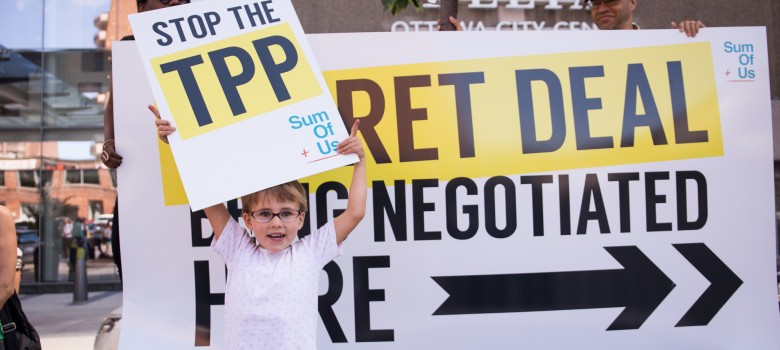Geist: Canadians, beware of the TPP
The TPP would criminalize your online activity, invade your privacy, and cost you money. Speak out now at Stopthesecrecy.net Article by Michael Geist Canada’s business community has mobilized in recent weeks to call on the government to adopt a more aggressive, engaged approach with respect to the biggest trade negotiations on the planet – the Trans Pacific Partnership Agreement. The TPP involves 12 countries including the United States, Australia, Mexico, Malaysia, Singapore, New Zealand, Vietnam, Brunei, Japan, Peru, and Chile.
My weekly technology law column (Toronto Star version, homepage version) notes that negotiators insist that progress is being made, but some in the business community are concerned that Canada may be left out of the deal unless it makes significant concessions on market access (including the dismantling of supply management in several agricultural sectors), restrictive intellectual property protections, and investor-state dispute settlement rules that allow companies to sue governments and potentially trump national courts.
The U.S. has been pressuring other countries to rapidly conclude a deal, though without “trade promotion authority”, which effectively locks it into a final agreement by removing the ability for Congress to modify the deal after others have signed on, the remaining countries are wary of revealing their best offer. Negotiations last week in Guam made only limited progress and a final meeting of government ministers has yet to be scheduled.
Delays will likely mean that Canadian business groups will continue to urge negotiators to move full steam ahead, but there are good reasons for caution.
Much of the business case focuses on concerns that failing to join the TPP will leave Canada out of a major trading block. Yet the reality is that Canada already has free trade agreements with nearly half of the TPP countries, including the U.S., Mexico, Chile, Peru, and South Korea. Moreover, Canada has engaged in free trade agreement negotiations with Japan and Singapore.
Free trade agreements with the likes of Brunei and Malaysia might provide some modest benefits to Canadian businesses, but Canadian trade interests are already well-covered within the much of the TPP community. Indeed, the costs of the TPP are a steep price to pay given the incremental gains that come from free trade access to a handful of additional countries.
- Read more at Michael Geist





 Take action now!
Take action now!
 Sign up to be in the loop
Sign up to be in the loop
 Donate to support our work
Donate to support our work